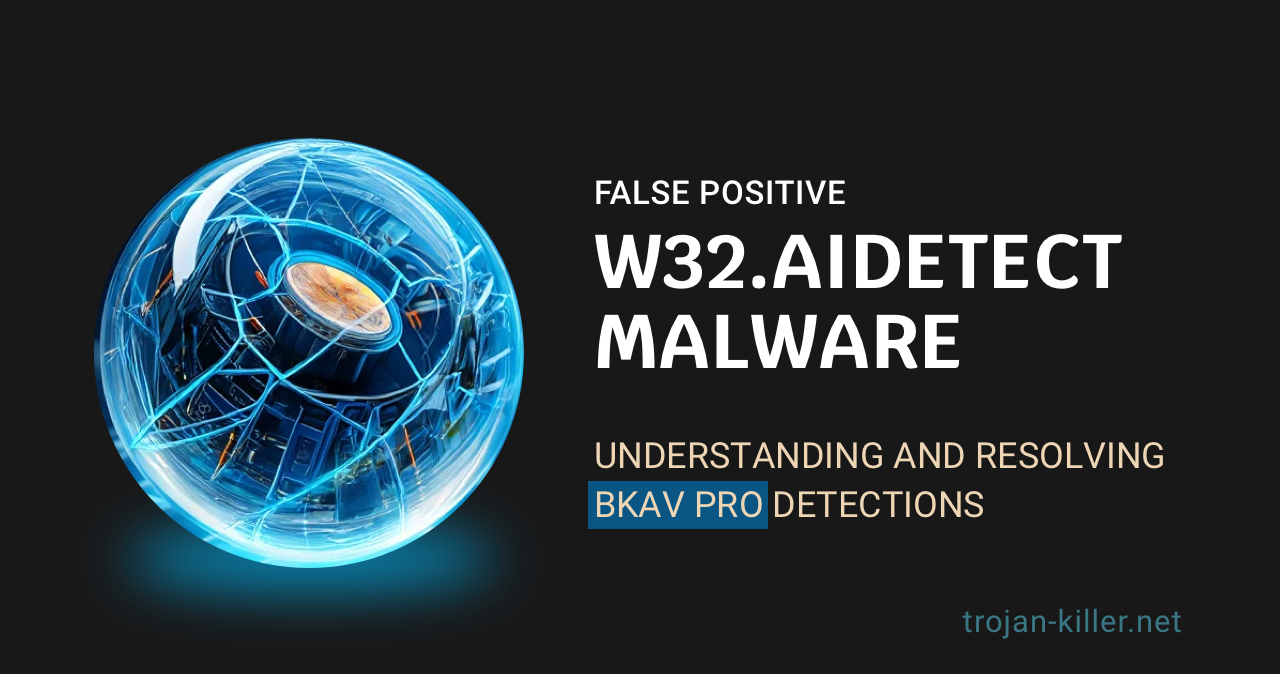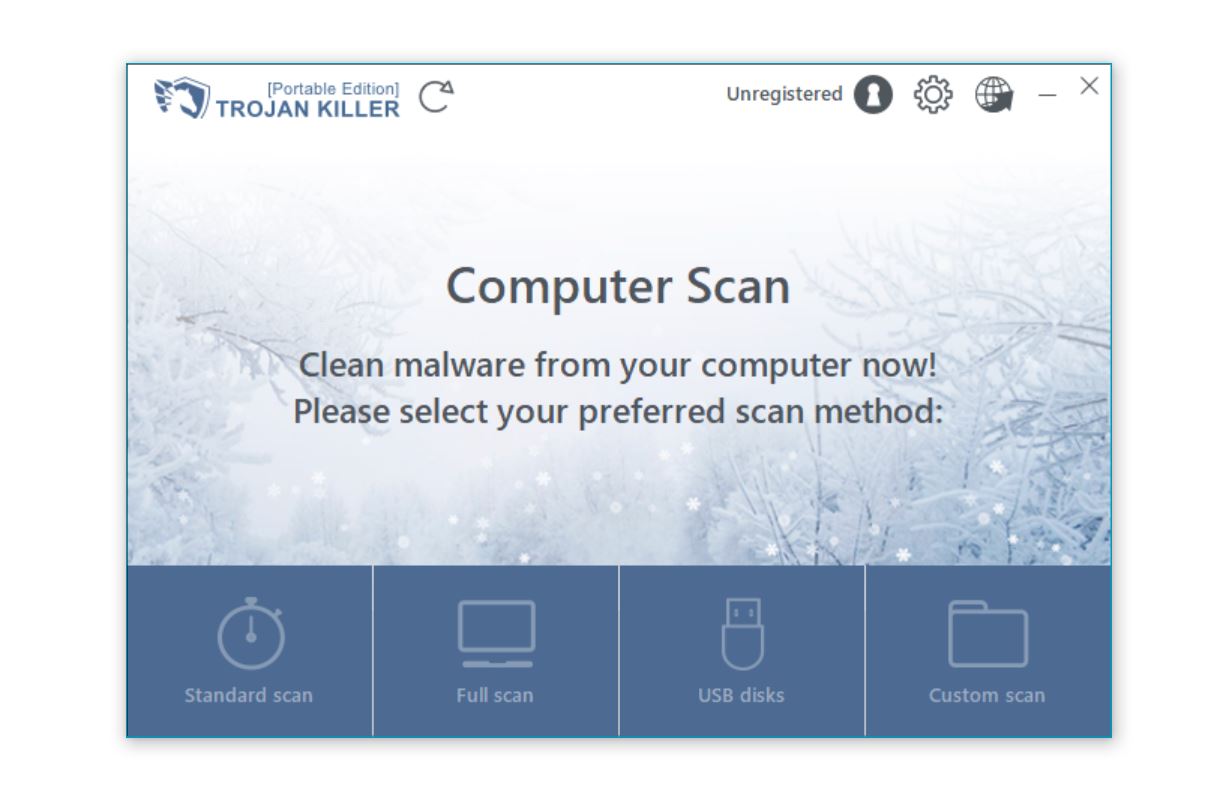Physical Address
Lesya Kurbasa 7B
03194 Kyiv, Kyivska obl, Ukraine
Physical Address
Lesya Kurbasa 7B
03194 Kyiv, Kyivska obl, Ukraine

W32.AIDetectMalware is a common detection name used by Bkav Pro antivirus that frequently appears as a false positive in VirusTotal scans. This comprehensive guide explains what this detection means, how to determine if it’s a genuine threat or false positive, and provides detailed steps for verification and removal if needed. By understanding how antivirus heuristic detection works, you’ll be able to properly respond to W32.AIDetectMalware alerts and maintain your system’s security.
| Detection Name |
|
| Type | Heuristic Detection / Potential False Positive |
| Detection Source | Bkav Pro Antivirus |
| Common Scenario | VirusTotal file scan results |
| Risk Level | Varies – Often false positive but should be verified |
| Affected Files | Setup.exe, Setup.msi, installers, utility software, program plugins |
| Verification Needed | Check for multiple antivirus detections, file source, and behavior |
W32.AIDetectMalware is a detection name used by Bkav Pro antivirus to identify files containing patterns or characteristics similar to known malware. Unlike specific malware detections that identify exact threats, W32.AIDetectMalware is a generic, heuristic detection that flags files based on suspicious patterns rather than confirmed malicious code. For a broader understanding of Bkav Pro’s approach to threat detection and false positives, see our complete guide to Bkav Pro false positives.
The detection name itself provides important clues:
What makes W32.AIDetectMalware notable is its high frequency of false positives – legitimate files incorrectly identified as malicious. This occurs because the AI-based detection algorithms used by Bkav Pro may flag common programming patterns found in both legitimate and malicious software. When you encounter this detection, particularly in VirusTotal reports, it requires careful evaluation rather than immediate concern.
VirusTotal is a platform that analyzes files using over 70 different antivirus engines. When you upload a file to VirusTotal, it’s common to see W32.AIDetectMalware as a detection from Bkav Pro, even when most other engines report the file as clean. This occurs because:
According to security researchers, certain types of files are especially prone to W32.AIDetectMalware false positives:
For a comprehensive look at common antivirus false positive detection names in 2025, check our complete guide to antivirus false positive detection names.
Source: GridinSoft Research, analysis of common false positive detections
When confronted with a W32.AIDetectMalware detection, it’s important to determine whether you’re dealing with a false positive or an actual threat. Here are key steps to make this determination:
The most important verification step is to check if multiple antivirus engines detect the file as malicious:
If more than 2-3 established security vendors identify the file as malicious, you should treat the file with caution and consider it a potential threat rather than a false positive.
The origin of the file is a crucial indicator:
Files obtained from official sources that trigger only W32.AIDetectMalware alerts are highly likely to be false positives.
Research the file and its publisher:
Genuine malware typically exhibits suspicious behavior:
If the file shows none of these behaviors after installation and performs only its advertised functions, it’s more likely to be legitimate despite the W32.AIDetectMalware detection.
If you’ve determined that a W32.AIDetectMalware detection may be a legitimate threat rather than a false positive, follow these steps to verify and remove the potential malware from your system.
The first step is to conduct a thorough scan using specialized anti-malware software that’s more precise than generic detections:

If you’ve identified specific software that triggered the W32.AIDetectMalware detection and suspect it might be malicious, you can uninstall it manually:
If the program doesn’t appear in the list or refuses to uninstall normally, you may need to use an advanced uninstaller tool or continue with the additional removal steps below.
Malware often creates persistence mechanisms to survive reboots. Here’s how to check and clean these areas:
# Execute in PowerShell as Administrator# Create backup of registry keysreg export HKCU\Software\Microsoft\Windows\CurrentVersion\Run backup-run.regreg export HKCU\Software\Microsoft\Windows\CurrentVersion\RunOnce backup-runonce.reg# Check startup items for suspicious entriesGet-CimInstance Win32_StartupCommand | Select-Object Name, command, Location, User | Format-Table -AutoSize# Remove suspicious startup items (replace [SuspiciousName] with actual name)# Remove-ItemProperty -Path "HKCU:\Software\Microsoft\Windows\CurrentVersion\Run" -Name "[SuspiciousName]" |
If you suspect browser-related issues due to potential malware, reset your browsers to default settings:
For Google Chrome:If you know when your system was last working properly, you can restore to that point:
While System Restore can be effective, it’s important to understand whether System Restore will actually remove viruses in your specific scenario.
If you’ve determined that the W32.AIDetectMalware detection was a genuine threat and standard removal methods haven’t resolved the issue, try these advanced techniques:
Starting Windows in Safe Mode limits the programs that run at startup, potentially preventing malware from loading:
Some malware corrupts system files. The System File Checker can repair these issues:
# Run in Command Prompt as Administratorsfc /scannow |
Whether you’ve experienced a false positive or a genuine malware detection, these preventive measures will help protect your system:
If you’re concerned about existing infections, our comprehensive malware removal guide offers additional strategies for cleaning your system.
W32.AIDetectMalware itself is not a virus, but rather a detection name used by Bkav Pro antivirus. It’s a heuristic detection that indicates a file has characteristics similar to known malware. In many cases, especially when found only by Bkav Pro in VirusTotal scans, it’s a false positive. However, if multiple reputable antivirus engines detect the same file, or if the file exhibits suspicious behavior, it may indicate an actual malware infection. The detection name itself doesn’t tell you specifically what type of malware might be present, only that the file matches certain suspicious patterns according to Bkav Pro’s detection algorithms.
This discrepancy occurs for several reasons. First, Bkav Pro (which triggers the W32.AIDetectMalware detection) uses particularly aggressive heuristic detection that prioritizes catching all potential threats, even if it means more false positives. Most consumer antivirus products balance detection rates with false positive rates more conservatively to avoid alarming users unnecessarily. Second, different antivirus engines use different detection technologies, databases, and thresholds for alerting. Your installed antivirus may have determined that the characteristics that triggered Bkav Pro’s detection are benign or fall below its confidence threshold for reporting. Generally, if your installed antivirus doesn’t detect any issues and the file was obtained from a trusted source, it’s reasonable to consider the W32.AIDetectMalware detection as a false positive.
To confidently determine that a W32.AIDetectMalware detection is a false positive, consider multiple factors: First, check if other reputable antivirus engines on VirusTotal also flag the file. If only Bkav Pro detects it, that increases the likelihood it’s a false positive. Second, verify the file source – files from official developer websites or legitimate app stores have a higher likelihood of being safe. Third, check if the software is digitally signed by a verified publisher. Fourth, scan the file with Trojan Killer or another reputable security tool that wasn’t part of the initial VirusTotal scan. Finally, monitor the application’s behavior after installation – genuine malware typically performs suspicious activities like creating unexpected connections, modifying system settings without permission, or degrading system performance. If none of these indicators suggest malicious intent, you can be reasonably confident the detection is a false positive.
You should not automatically delete files detected only as W32.AIDetectMalware without further investigation. This detection alone, especially if it’s only from Bkav Pro on VirusTotal and not corroborated by other antivirus engines, is often a false positive. Before taking action, verify whether the file is legitimate using the methods described earlier: check the file source, look for digital signatures, scan with additional security tools like Trojan Killer, and monitor the file’s behavior. However, if you obtained the file from an untrustworthy source, multiple security products flag it as suspicious, or it exhibits malicious behavior after installation, then removal is recommended. When in doubt about an essential system file or business application, consider quarantining rather than deleting, which allows you to restore the file if you later determine it was a false positive.
Understanding what happens if a virus is not removed can help you make an informed decision about whether to delete suspicious files.
For security professionals and technically-minded users, understanding how heuristic detection works can help contextualize W32.AIDetectMalware alerts:
Heuristic detection, which powers alerts like W32.AIDetectMalware, operates by examining files for suspicious characteristics rather than exact malware signatures. This approach includes:
Bkav Pro’s W32.AIDetectMalware detection appears to place heavy emphasis on code patterns and structural elements, which is why it frequently flags installation files and software utilities that use common programming techniques also seen in some malware.
Files flagged with W32.AIDetectMalware often contain these legitimate but potentially suspicious elements:
Many legitimate applications, particularly installers and system utilities, require these capabilities for proper functioning, which explains the high rate of false positives.
W32.AIDetectMalware detections require careful evaluation rather than immediate concern. In most cases, particularly when only Bkav Pro flags a file in VirusTotal scans, these alerts are false positives rather than genuine threats. By understanding the nature of heuristic detection and following the verification steps outlined in this guide, you can confidently determine whether further action is necessary.
For genuine threats, the comprehensive removal steps provided will help you clean your system effectively. Remember that prevention remains the best strategy – obtaining software from official sources, keeping your system updated, and using reliable security solutions like Trojan Killer will minimize both false positives and genuine security incidents.
If you’re experiencing other suspicious ML-based detection alerts, you might want to read our guide on dealing with Trapmine Suspicious Low ML Score detections, which covers similar AI-based false positive scenarios. For a broader understanding of Bkav Pro’s false positive patterns and how to address them beyond just W32.AIDetectMalware, check our complete guide to handling Bkav Pro false positives.
By balancing healthy skepticism with understanding of how security software works, you can maintain a secure system without unnecessary concern over common false positives like W32.AIDetectMalware.